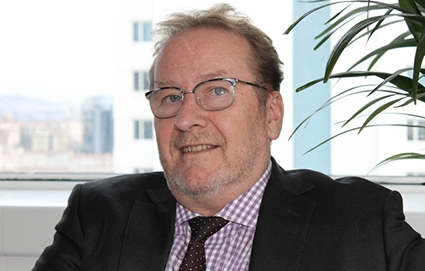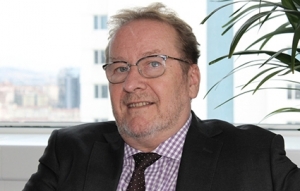Heimo Laakkonen on SDGs, Gender Equality and Population Dynamics
This week Tbilisi welcomed the high-level international conference: Achieving Gender Equality – Challenges and Opportunities in the European Neighborhood Policy (ENP) Region.
Around 250 guests and high-ranking officials, including Georgian Prime Minister Irakli Garibashvili, high-level representatives from the European Union’s Department of Foreign Affairs and Security Policy, the Assistant Secretary-General of the United Nations, and the Director of the UNDP Regional Bureau for Europe and the Commonwealth of Independent States, Cihan Sultanoglu participated in the event as part of a joint initiative by the Georgian Government and the United Nations and European Union.
Another important guest at that Conference, Mr. Heimo Laakkonen, Director of the UNFPA Eastern Europe and Central Asia Office, was kind enough to share his ideas with Georgia Today.
“Transforming our World: the 2030 Agenda for Sustainable Development“ – This Resolution and the Sustainable Development Goals (SDGs) adopted by the General Assembly on 25 September 2015 emphasized that the Agenda for the next 15 years is a plan of action for people, planet and prosperity. It also seeks to strengthen universal peace in greater freedom. How does the UNFPA see its role in helping the countries to achieve those SDGs? How you see the role of the UNFPA in Georgia in this regard?
2015 has been a big year for the entire family of UN Member States, including Georgia with world leaders having committed to implementing the comprehensive SDG agenda adopted at the UN GA in September. In 2014 we marked the 20th anniversary of the International Conference on Population and Development (ICPD). Together with member states, we assessed how far we have come in achieving the goals set 20 years ago – globally, in this region and at the country level, including here in Georgia. The assessment issued in 2014 clearly showed progress in areas such as health and longevity over the past two decades. And yet it also warned of the threat of increasing inequalities. Governments have been urged to pass and enforce laws to protect the poorest and most marginalized, including adolescent girls and women affected by violence as well as rural populations. These messages are fully applicable to this region as well.
The global SDG agenda fully integrates the priorities outlined by the ICPD review: reducing maternal mortality; ensuring universal access to reproductive health and rights services, information and education; integration of reproductive health (RH) into national development strategies and programmes; taking account of population trends and projections in national rural and urban development strategies and policies; eliminating all forms of discrimination and violence against all women and girls in the public and private spheres, including through the engagement of men and boys; eliminating all harmful practices such as child, early and forced marriage, etc.
The Sustainable Development Goals are ambitious, and they will require enormous efforts across countries, continents, industries and disciplines – but they are achievable.
The UNFPA is working globally with governments, partners and other UN agencies to directly tackle many of these goals – in particular Goal 3 on health, Goal 4 on education and Goal 5 on gender equality – and contributes in a variety of ways to achieving many of the remaining goals.
Let me say in this context that we welcome the introduction of the universal health program in 2013 by the Government of Georgia. This is a major step towards making health services more accessible and reducing inequalities.
I also welcome the commitment of the Ministry of Labor, Health and Social Affairs to support the expansion of breast and cervical cancer screening programs. This is very important, and the plan to introduce an organized cervical cancer screening program in partnership with the UNFPA is a remarkable step forward as it will increase the quality of the screening program and the coverage of the target population, which in turn will reduce the number of women dying from cancer.
We are working with the authorities to strengthen primary health care in Georgia through better integration of reproductive health services, improving access to youth-friendly services and making sure clinical protocols are used for quality assurance.
Although considerable progress has been made over recent years, many issues remain to be addressed, particularly in light of the enormous economic, social and demographic changes in the country.
You came to Georgia to participate in a High-Level Conference on Gender Equality. What was the focus of your intervention? What is the UNFPA doing to advance Gender Equality in the Region and in Georgia?
It is no coincidence that this important meeting took place in Georgia, a country which has made remarkable progress over the past decades towards strengthening the human rights and gender equality agenda, including the goals set at the International Conference on Population and Development.
Just to give a few examples (from the 2010 RH Survey supported by UNFPA, USAID and UNICEF):
• The use of modern contraceptive methods among married women increased from 20% in 1999 to 35% in 2010;
• The Total Induced Abortion Rate more than halved between 1999 and 2010, from 3.7 to 1.6.
Importantly, these achievements were made while the total fertility rate went up. This means Georgians used more contraception, allowing them to make choices about when to have children and how many, and at the same time they had more children – not fewer. This debunks the still widespread myth that better access to contraception would lead to lower fertility levels.
Addressing discrimination and violence against women is a major challenge that needs much more attention. Globally, one in three women experience violence, often within families. In Georgia, and other countries of the region, the UNFPA supported the first nationwide research projects on domestic violence, providing indispensable data for evidence-based policies and programs.
Deep-rooted gender inequalities are also a key factor for a trend we have been observing in the South Caucasus, including in Georgia: the practice of pre-natal sex selection in favour of sons, leading to a skewed birth ratio with far-reaching social and demographic consequences (in Georgia 110 boys are born for every 100 girls). We have supported a major study together with the World Bank, shedding light on causes, consequences and implications of this harmful practice to provide evidence and recommendations on how to counter it. It has been estimated that in 2010 in Georgia 25,000 girls of age 0-19 had already gone missing due to this practice. This has significant implications for Georgian society and the country’s demographic situation. It is clear that without making progress on gender equality it will be impossible to reverse this trend.
In more than 14 countries throughout the region, including Georgia, the UNFPA helps to promote a multi-sectoral approach to combatting gender-based violence, including by working with health care professionals to recognize and provide appropriate services for victims of violence; all countries have been trained on healthcare sector response to GBV and equipped with regionally developed tools.
Harmful traditional practices of child marriage and bride kidnapping still exist in the region. Child marriage hinders girls’ rights to education, life and physical integrity – in Georgia the UNFPA supports strengthened prevention of this harmful practice and facilitates the work of a specific inter-sectorial Task Force established at the Prime Minister’s Office.
In Georgia and in other countries in the region, the UNFPA helps in promoting men’s involvement for greater gender equality and combating violence against women and girls through supporting innovative gender transformative programming and mobilizing men as actors for change.
Population dynamics has become an important factor that determines the social and economic development of nations and countries. Georgia, like many other countries of the region, faces challenges related to ageing. What is the focus of UNFPA support in this area?
Integration of population dynamics and trends into national development planning is increasingly becoming a priority for UNFPA assistance globally, in the region, as well as in Georgia, as the country, together with other countries of the region, faces challenges related to changes in the population structure and ageing.
The UNFPA has been a leading partner for the government in undertaking the 2014 census, analysing and disseminating data to inform policy-making and planning.
One of the important aspects of population dynamics is related to young people. Young people have the potential to have a very positive impact on a country’s sustainable development, if they have the opportunity to fully realize their potential, have access to quality education and healthcare, including in the area of reproductive health, and have opportunities for descent employment.
Investing in youth development will also help countries to respond to challenges of ageing – a demographic phenomenon observed in almost all countries of the region.
In Georgia, UNFPA is collaborating with the Parliament and the Government, for example on elaborating Georgia’s National Action Plan on Ageing based on the recommendations provided in the comprehensive Road Map on Mainstreaming Ageing.
UNFPA is committed to continuing its technical and policy advice support to ensure that national development strategies address population dynamics by accounting for population trends and projections in setting development targets.
Katie Ruth Davies












